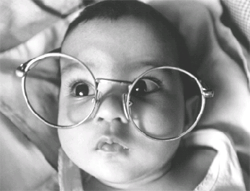Babies in the dark
 often mothers leave lights on in the nursery or where babies and toddlers are made to sleep. This could be either due to the feelings of mothers that light could be comforting or just as a precautionary measure as light is always more reassuring for one's security. However, research just published shows that such a step, almost universally followed, could well lead to short-sightedness.
often mothers leave lights on in the nursery or where babies and toddlers are made to sleep. This could be either due to the feelings of mothers that light could be comforting or just as a precautionary measure as light is always more reassuring for one's security. However, research just published shows that such a step, almost universally followed, could well lead to short-sightedness.
Research conducted by Richard A Stone of the Schele Eye Institute at the University of Pennsylvania, Philadelphia, found strong evidence of a relationship between short sightedness or myopia and exposure to light at night in babies between birth and the age of two. The researchers asked parents visiting their paediatric ophthalmology clinic about the history of their infants' exposure to light at night ( Nature , Vol 399, No 6732).
The researchers investigated 479 children between the ages of 2 and 16. They asked the parents whether their kids slept with the light on, with a night light, or in darkness till the age of two when the eyes grow rapidly. They were surprised to find that just 10 per cent of the children visiting the eye clinic with myopia sleep in darkened nurseries. This contrasted sharply with 34 per cent of infants who slept with a
